The PA stumbled from one failure to another. Has its reckoning arrived?
The decades-long decline of the Fatah party has proven to Palestinians that the PA is an obstacle, not a vehicle, for their national liberation.
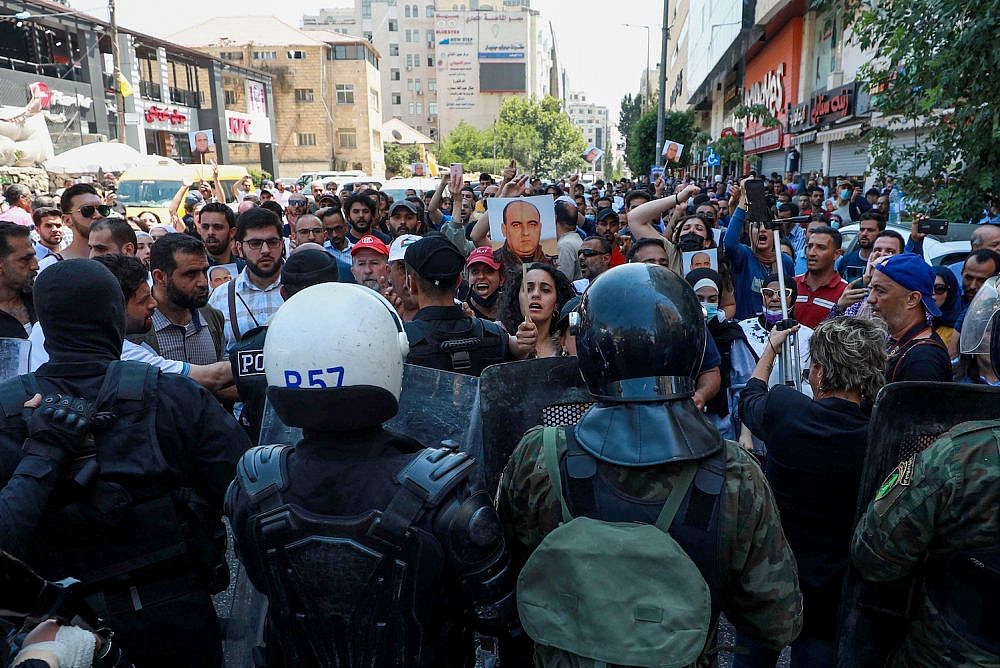
Since the killing of activist and government critic Nizar Banat under Palestinian police custody two weeks, hundreds have been gathering in West Bank cities like Ramallah, Hebron, and Bethlehem to protest what many have described as Banat’s “assassination” and to call for the resignation of Mahmoud Abbas, the president of the Palestinian Authority. The protests have been violently met by the PA’s U.S.- and EU-trainedand funded security forces, seeing the longstanding simmering tensionsbetween the denizens of the occupied West Bank and the PA come to the fore.
The clumsy killing of a popular local activist, as well as the repressive response from security forces, have revealed the extent of the ineptitudeand dwindling legitimacy of the Fatah-led PA. Beyond Banat’s killing, the popularity of both Fatah as a political party and of the PA as a governmental body has been in freefall since Fatah ousted Hamas from government a year after the latter’s 2006 legislative election victory. Since then, Palestinian politics has found itself at an impasse, all while Israel’s settlements continue encroaching into the West Bank and its crippling blockade on Gaza remains in force.
This made Abbas’ decision in April to promptly dash Palestinian elections, which were set for the summer of 2021, sting all the more sharply. Today, it is clear that many Palestinians no longer place much value on the PA’s proclaimed commitment to democracy nor their purported fight for liberation. After narrowly surviving the relentless attacks of the Donald Trump years, the PA now finds itself clamoring to rein in its authority as Palestinians take to the streets — a political reckoning it has evaded for decades.
Sanctioned authoritarianism
The Palestinian Authority was born out of the 1993 Oslo I Accords, of which Mahmoud Abbas was one of the main architects. The Accords designated the PA as the administrative body, intentionally separate from the Palestine Liberation Organization, that would govern to varying degrees about 40 percent of the occupied territories (Areas A and B).
Among other things, its stipulations tasked the PA with “internal security and public order… [and] to prevent terror against Israelis in the areas under their control,” which would be done in coordination with the Israeli military authorities. Israel, meanwhile, would retain security and administrative control over 60 percent of the West Bank (Area C), with the ability to enter PA areas when it deemed necessary.
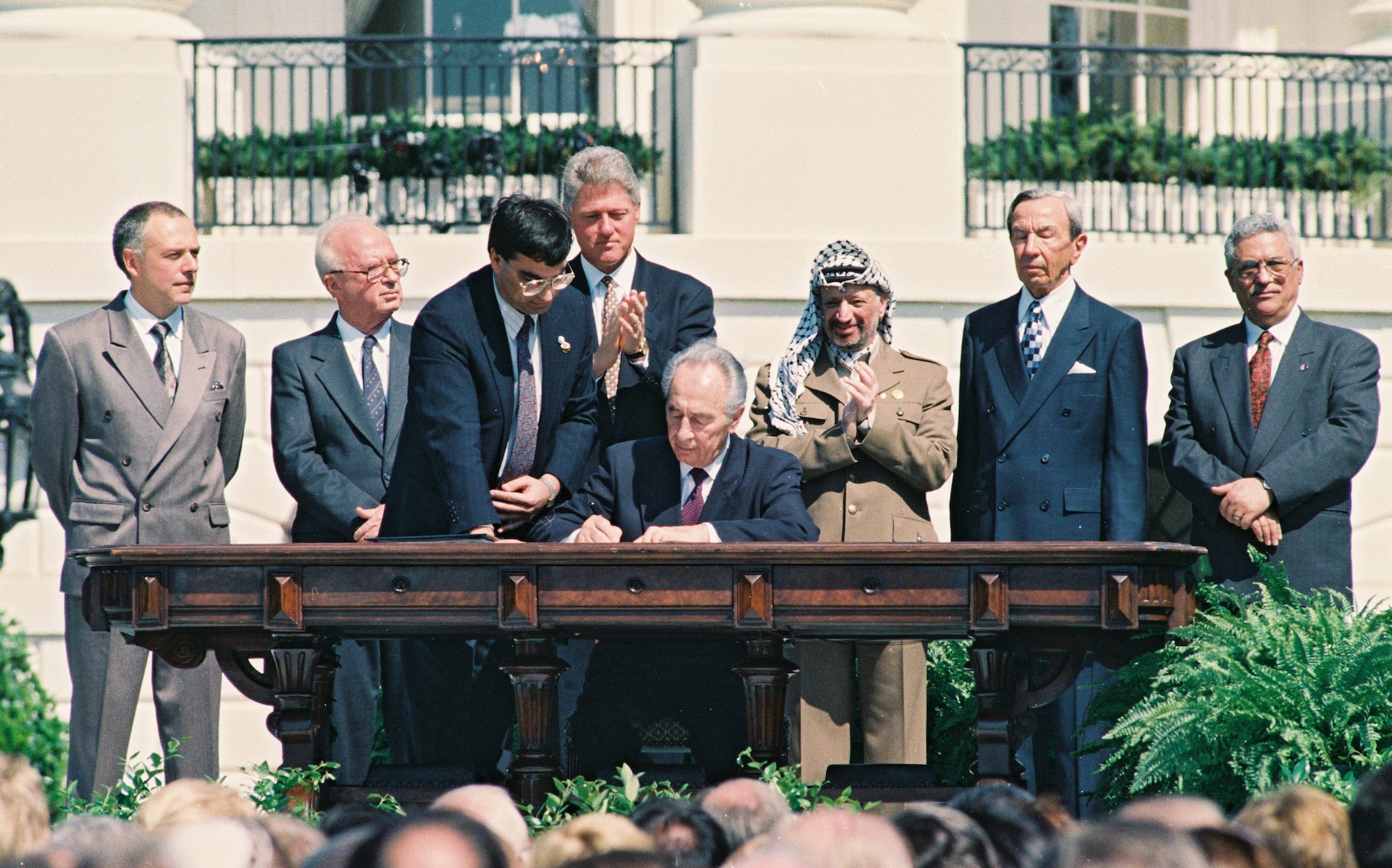
Under U.S. and Israeli auspices, the institutional power granted to the PA effectively ratified Fatah — the largest faction in the PLO, then-led by Yasser Arafat — as both the pseudo-governmental representative of the Palestinian people and the de facto local authority in the main Palestinian population centers in the West Bank and Gaza. Although other parties were included in the new institution, Fatah’s primacy was effectively determined three years before the PA’s first election was held in 1996. This dynamic helped Fatah marginalize other factions in the PLO and exclude them from shaping the Accords and the future of the promised Palestinian state.
For several years, the internal blow wrought by Fatah’s power grab was papered over by the charismatic sway of Yasser Arafat himself. Chairing both the PA and PLO, Arafat described his maneuvering between Palestinian factions as traversing “the democracy of the jungle of guns” — a dictatorial dance of appeasement with the adornments of pluralism. Abbas, who took over Arafat’s dual positions after his death in 2004, lacked the charisma and support to sustain that same political balancing act.
The bolstering of the PA as the wielder of Palestinian political power, and the shrinking of the PLO into a symbolic organization, laid the foundation for Fatah’s now deeply-entrenched authoritarian rule. That regime only hardened after Fatah, with the backing of Western governments, ejected Hamas from the PA after a violent civil conflict in 2007. Since then, Fatah has vested its interests — and indeed, its survival — in upholding the increasingly derelict Accords and the PA itself. Trapped by their leaders’ intransigence, many Palestinian residents of the occupied territories have been effectively resigned to either the autocracy that Fatah imposed in the West Bank or the similarly authoritarian regime Hamas built in Gaza.
A lifeline through the ballot box
After 14 years of paralysis, Abbas’ unexpected announcement in January to organize Palestinian elections sparked much lively political and public engagement in both the West Bank and Gaza Strip. About 30 electoral lists signed up for the parliamentary contest and over 90 percent of eligible Palestinians registered to vote; Nizar Banat himself registered to run as a parliamentary candidate under the newly formed “Freedom and Dignity” list.
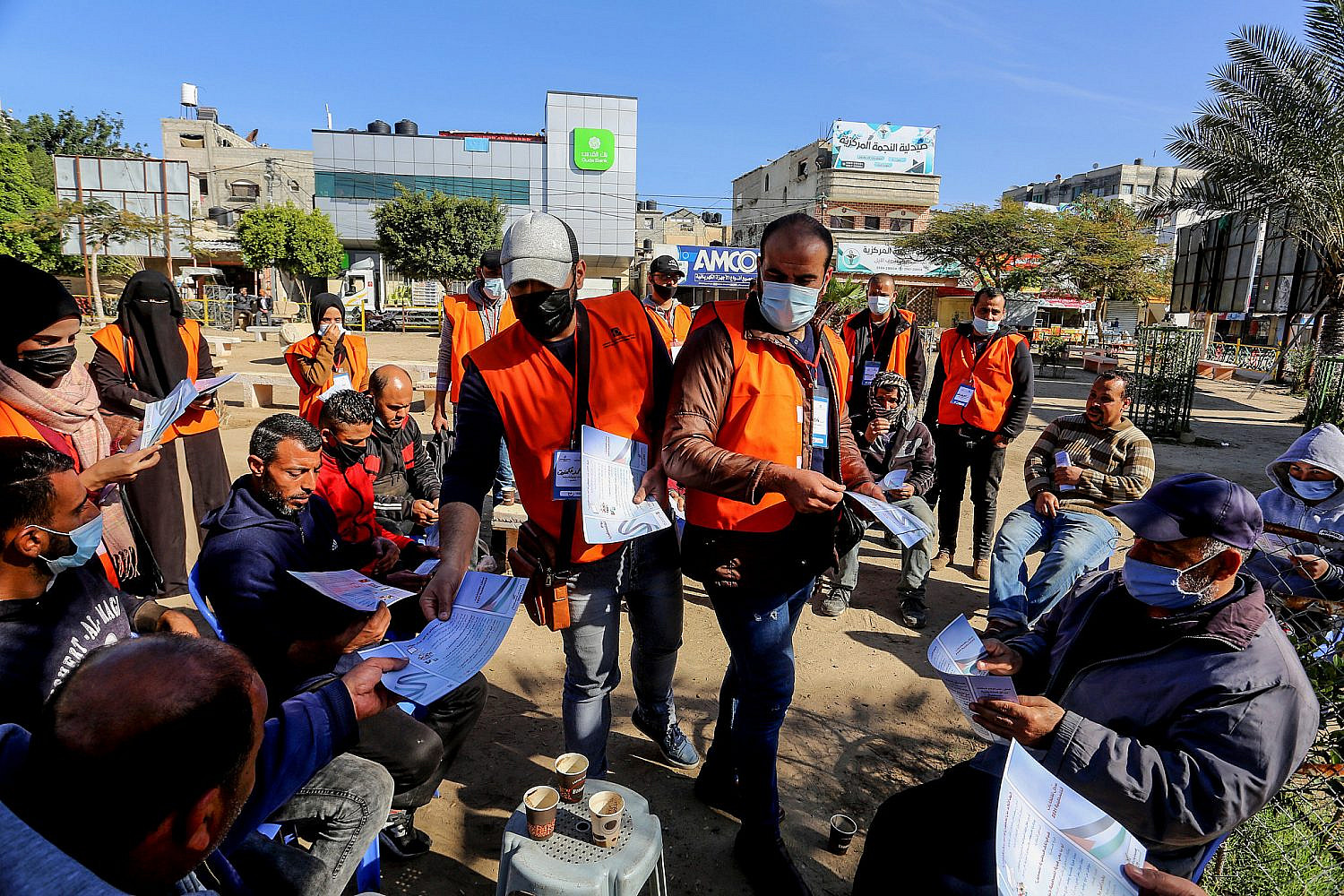
The PA’s greenlighting of elections, analysts argued, was primarily due to Fatah’s belief that it had been given a lifeline by the recent election of Democratic President Joe Biden in the United States. For four years, the PA’s future was in dire uncertainty during the administration of Donald Trump, which persistently undermined the Ramallah-based government.
This was especially the case following the 2020 announcement of the “Deal of the Century,” a U.S.-Israeli blueprint for establishing a “solution” that, in essence, was an Oslo Accords redux. Abbas vehemently rejected the deal and even suspended security coordination, while Trump denied the PA a seat at the negotiating table, pulled $200 million in annual funds for Palestinians, and went ahead with the plan regardless of Abbas’ say.
Within the first months of his new administration, Biden promptly reinstated U.S. aid payments to the Palestinians that had been pulled by his predecessor. Nonetheless, Biden has signaled that he intends to build on Trump’s vision for the conflict and the region’s future based on both the Deal of the Century and the Abraham Accords, the Israel-UAE-Bahrain deal signed last August.
This brushing off of the PA by the very nations that granted it power under the Oslo Accords nearly 30 years ago rang alarm bells within Fatah. Having lost much of its popular support over the decades, Fatah recognized that their only real form of political agency stemmed from the PA’s existence, along with the PLO’s historically recognized position as the representative of the Palestinian people. As such, Fatah could not afford to be undermined again on the international stage, lest they further lose their diminishing standing among the electorate in the barely sovereign territories it governs.
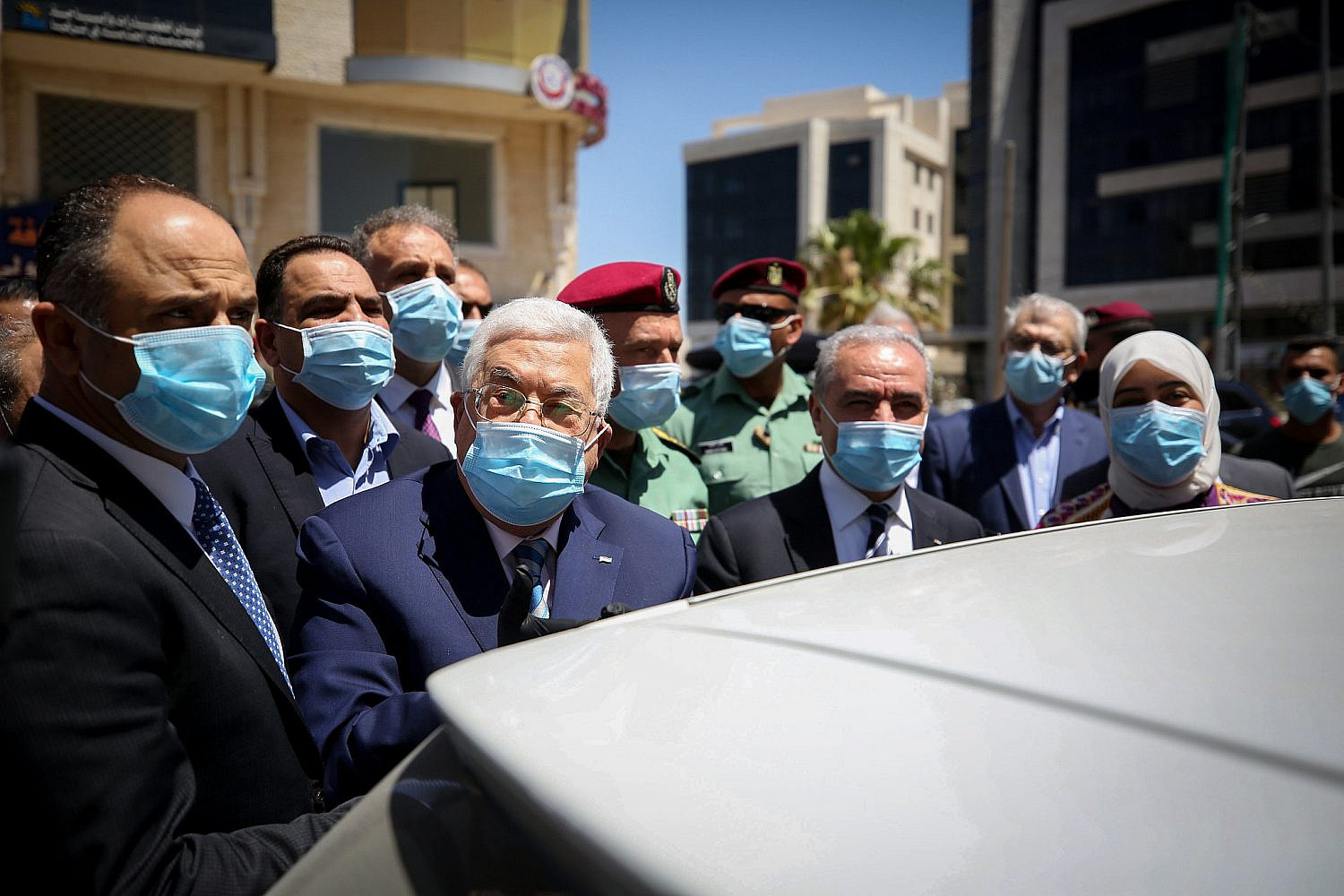
Not wanting to draw political mockery, lose financial aid, and once again be denied a seat at the table — or worse, bring the PA’s redundancy into starker reality — Abbas restored security coordination and called for elections to reposition Fatah and the PA in Washington’s good graces, as Arafat did before him with the signing of Oslo. By winning the elections, Abbas hoped to send a message to the Biden administration — and indeed, Israel — that the PA was ready for a return to the “old normal,” or at least to be cooperative with the new regional shifts that the United States has been carving out.
Abbas’ strategy backfires
Internal divisions within Abbas’ party, however, quickly surfaced when jailed Fatah leader Marwan Barghouti and Nasser al-Kidwa, a nephew of the late Arafat, announced a rival slate of candidates under the “Freedom” list to run against Abbas’ ticket. Soon after, the PA’s former Gaza security chief Mohammed Dahlan, who was expelled from Fatah in 2011 and then convicted in absentia of corruption, further split the party when he announced his own candidacy under the “Future” slate. Dahlan currently resides in the United Arab Emirates and is said to enjoy close ties with Crown Prince Mohammed bin Zayed.
With these unexpected intra-party developments, polls projected that Abbas would finish second behind Barghouti in the presidential election, whose imprisonment and continued activism behind bars only amplified his longstanding popularity. The victory which Abbas had hoped for was no longer a foregone conclusion, and instead became a public test of his claim to follow through on Palestinian democracy.
In April, Abbas hastily tried to undo his “mistake” by indefinitely postponing the elections on the grounds that Israel had failed to confirm if it will allow the Palestinian residents of occupied East Jerusalem — from which the PA’s presence was effectively expelled after the Second Intifada in the early 2000s — to vote.
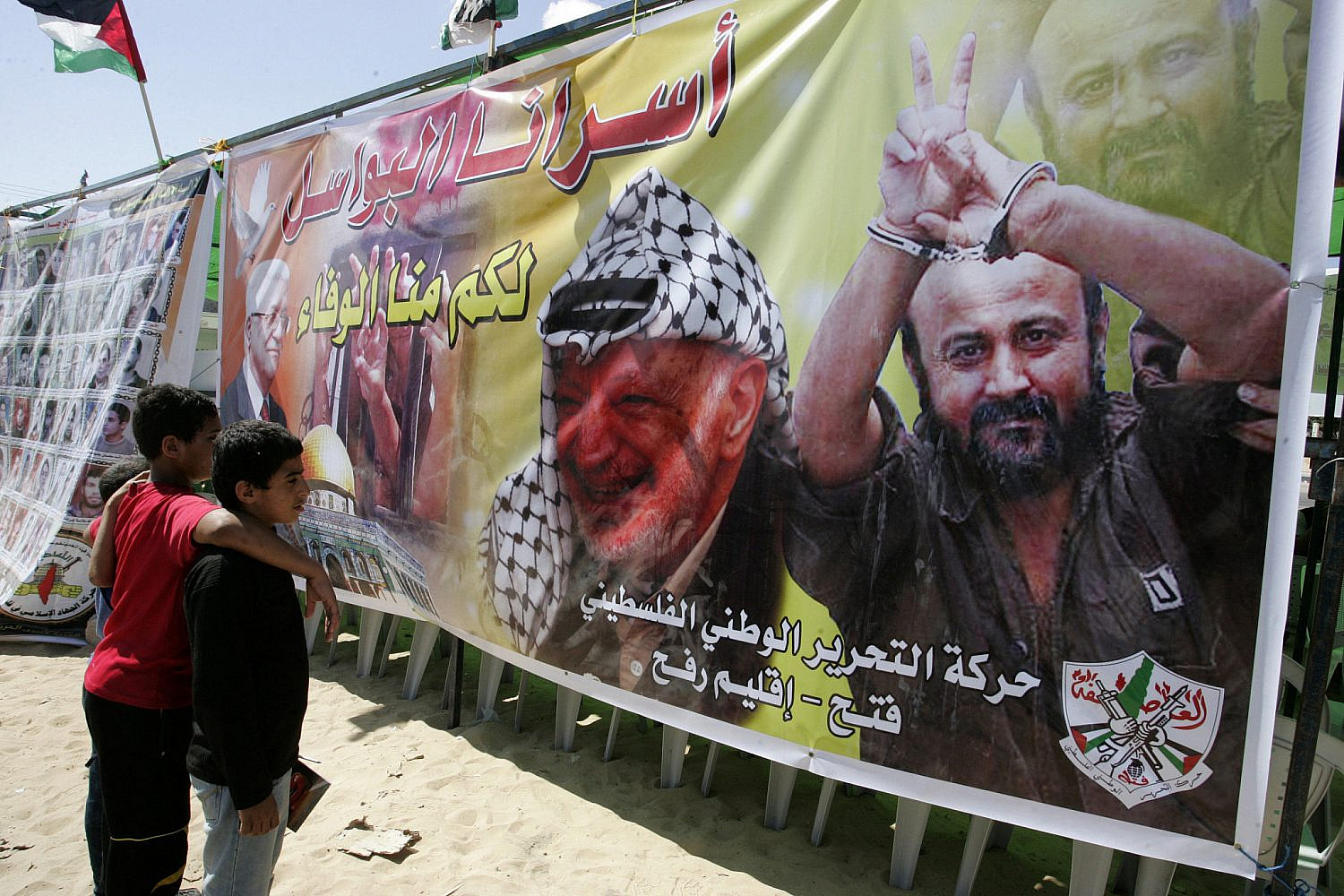
This excuse was seen as a convenient, and very transparent, crutch for Abbas to avoid a landslide loss in the elections; many lamented the president’s clear unwillingness to explore alternatives for the city’s Palestinians to cast their ballots, such as voting through mail or at polling stations at the city’s outskirts. The cancellation sparked outrage from the Palestinian public long awaiting elections, with several protests breaking out across the West Bank the next day.
Ironically, less than two months after Abbas used Jerusalem’s occupied status for his political gain, the president’s expressed concern would be challenged by the city’s Palestinian residents when Israeli authorities escalated their efforts to evict families from the Palestinian neighborhoods of Sheikh Jarrah and Silwan.
But aside from a broadcasted, polemically-charged speech urging the United States and Israel to “release [our] hearts,” Abbas and his government have done little to deter the occupation’s actions against the Palestinian inhabitants, who have instead taken it upon themselves to organize against the occupation’s threats. Even during the war on Gaza and the rising momentum of the “Unity Intifada,” the PA remained almost entirely absent. Prior to the elections’ postponement, 68 percent of Palestinians had sought Abbas’ resignation; today, that number has surely risen even further.
An obstacle to liberation
Now, in the face of growing Palestinian resistance on the streets of Ramallah itself, the PA is unabashedly flexing its Oslo-sanctioned authoritarian power through the ongoing crackdown of protesters, whom the PA has framed as unwitting Israeli, foreign, or Hamas agents looking to sow discord — accusations that draw parallels to governments’ responses to the 2011 Arab Spring. PA forces have arrested numerous protestors as well as human rights lawyers and journalists covering the protests.
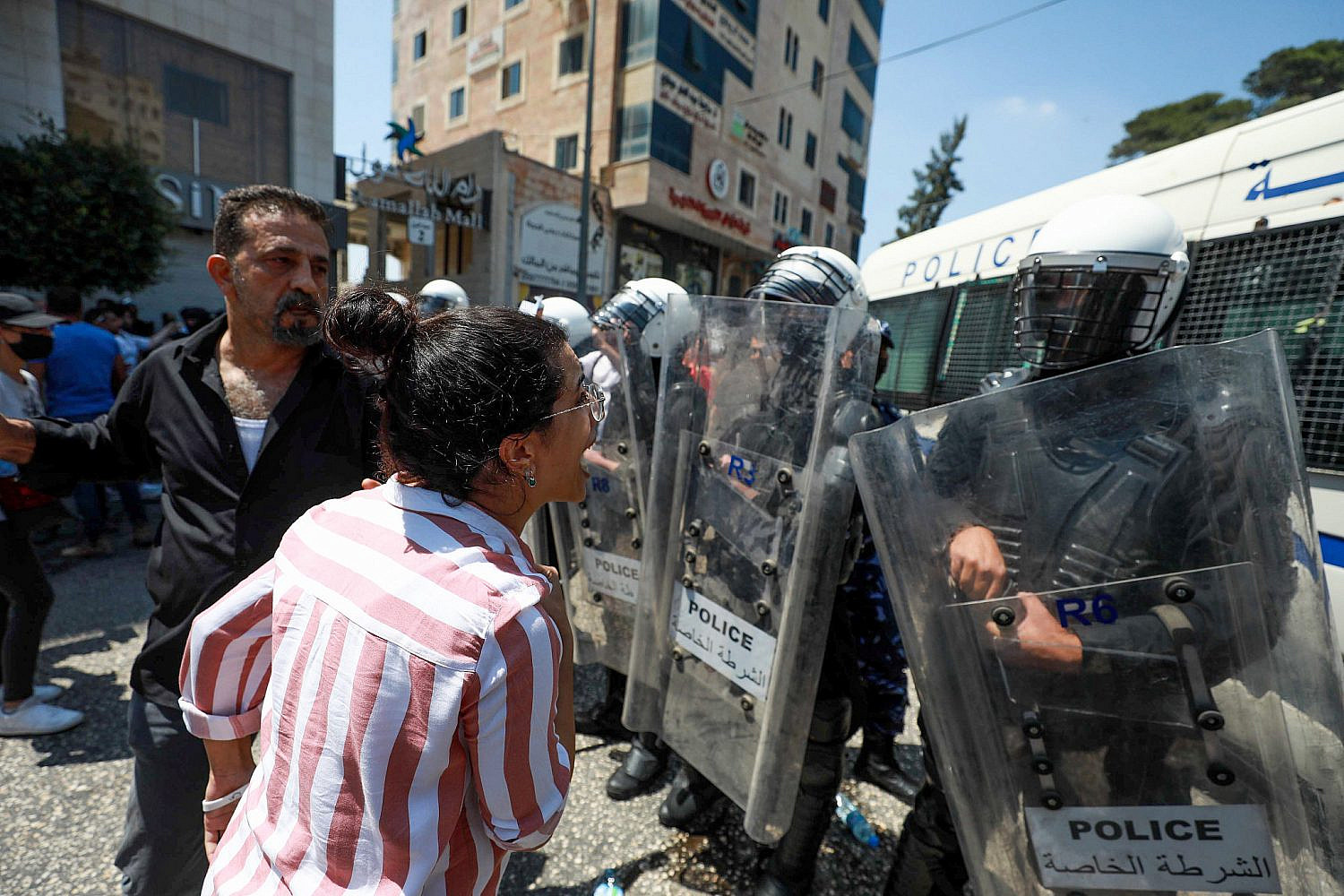
Meanwhile, condemnation of the PA’s brutal response been made by the very institutions that fund and train the PA’s police force, with the U.S. State Department saying it had “serious concerns about Palestinian Authority restrictions on the exercise of freedom of expression… and harassment of civil society activists and organizations.”
Despite the PA’s abandonment of its people, 2021 has witnessed the resolve of Palestinian civil society and grassroots movements in resistingthe Israeli occupation come to some fruition. They have mobilized the Palestinian public to pierce through mainstream news discourse and move the international rhetoric on the occupation forward, particularly in the United States, where progressive Democrats have brought the question of U.S. financial support to Israel to the House floor amidst the IDF’s bombing of Gaza in May.
The early democratic excitement and valiant activist efforts of this year, and now the civil rage in response to Nizar Banat’s killing, shows a Palestinian population tired of the Oslo-induced inertia and who are ready for effective political mobilization. Now, all the PA has left is to exercise its monopoly on violence over its own people — the only form of Palestinian violence tolerated and sanctioned by Israel, the United States, and the European Union.
With the leadership of a half-mast Palestinian “state” firmly embedded in benefiting from the continued presence of the occupation, it has become clearer than ever that the PA is an obstacle to the end of that military regime, rather than a vehicle for liberation as it has continuously declared itself to be.
The grassroots organizing of recent years — as seen with the Boycott, Divestment, and Sanctions movement, local resistance such as in Sheikh Jarrah and Silwan, and online collectives working to break media censorship of the occupation — shows that the future of Palestinian activism and politics lies outside of the legal bodies and structures approved by the same governments that maintain Israel’s rule.





Geen opmerkingen:
Een reactie posten